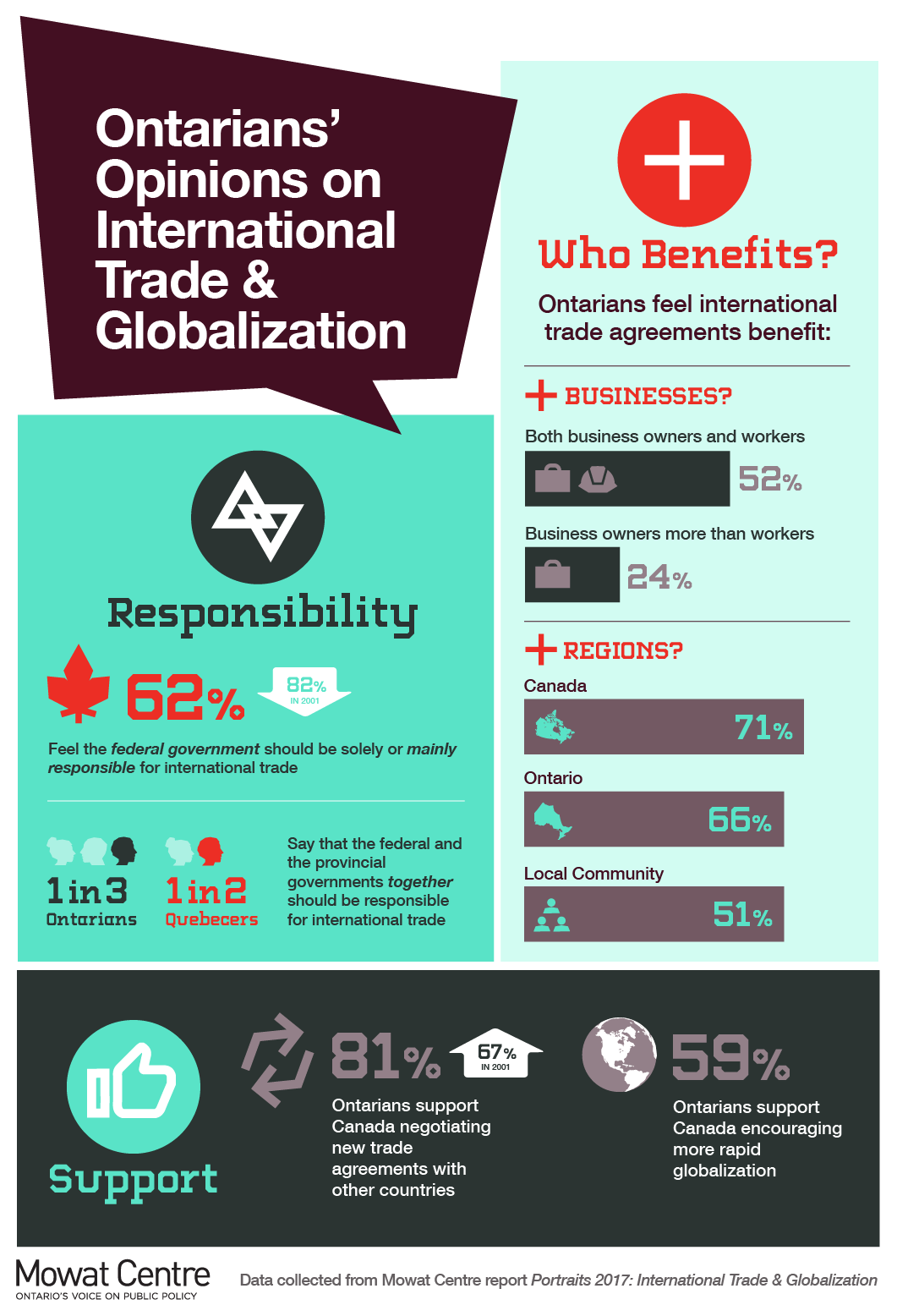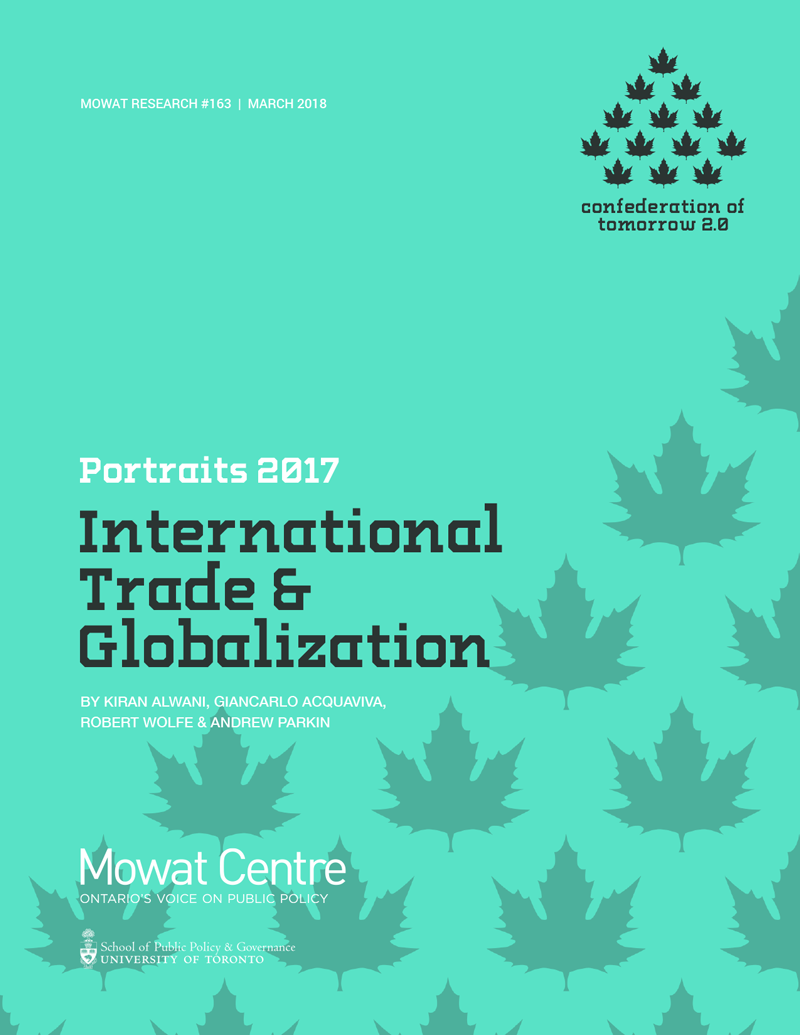March 28, 2018
Most Ontarians support international trade agreements and a majority of Ontarians support more rapid globalization. These are among the main findings in the latest report from Mowat’s Portraits 2017 survey series.
But the report also finds several cautionary notes for policy-makers. For instance, 60 per cent of Torontonians think international trade benefits their local community, whereas in eastern and southwestern Ontario only about four in ten share this view and about three in ten believe international trade harms their community. A plurality of Ontarians say that the US benefits more than Canada from trade between the two countries. Ontarians under 35 are now less supportive of international trade and globalization than are older Ontarians, and about a quarter of Ontarians are opposed to more rapid globalization.
Introduction
The UK is leaving the European Union, the world’s largest single market. The US has walked away from a trans-Pacific trade accord and has triggered a renegotiation of the North American Free Trade Agreement (NAFTA). Do these moves signal growing public skepticism in Western democracies about the benefits of globalization or the importance of international trade deals? In the case of Ontario, does the public continue to support trade and trade agreements?
The recent Mowat Centre Portraits 2017 survey finds that the answer to the latter question is yes.
The issue of trade liberalization famously divided the Canadian public and framed national electoral campaigns several times in the nineteenth and twentieth centuries, most notably in 1988. By the turn of this century, however, a more favourable and less polarized public mood on the issue had evolved as the original trade agreement with the US and its successor, NAFTA, took effect along with the implementation of the 1995 World Trade Organization agreements. The Seattle (1999) and Quebec City (2001) protests against globalization and trade liberalization notwithstanding, by 2001 a large plurality of Canadians supported both globalization and the negotiation of new international trade agreements.1
In the current environment, however, it would be unwise to simply assume that this more positive public attitude still holds. The UK’s Brexit vote and the election of Donald Trump in the US both serve as reminders that the public mood can shift. Pundits have concluded that “both Trump’s upset victory in the US election, and Britain’s referendum in favour of exiting the EU were campaigns won in part on a rejection of trade liberalization.”2
Continue Reading
There are a number of recent developments which might be expected to have shaped attitudes to trade and globalization in Canada and Ontario. These include the financial crisis that began in 2008, the continuing loss of stable manufacturing jobs and the rise of more precarious modes of employment. They also include developments in the area of trade itself: the federal government has negotiated new trade agreements, including one with the European Union and another with 10 other Pacific countries. And Canada is now engaged in the high-profile renegotiation of NAFTA at the insistence of a US President who has threatened to rescind the agreement if he doesn’t get the outcome he wants.3
This complex mix of positive and negative signals may have impacted how Canadians assess the benefits of trade liberalization. Does the Canadian public remain as supportive of trade and globalization as it was at the turn of the millennium? Has support for international trade agreements eroded in the wake of recession? Does the intense coverage of American angst about trade have a spillover effect (either positive or negative) on Canadians’ views?
Knowing more about public attitudes matters for policy. It is certainly important for policy-makers to know whether public opinion on trade issues and government actions are aligned. In the US, at least, there is evidence to suggest that the extent of the public’s souring on NAFTA has been over-stated, and that something other than public attitudes towards trade deals is driving the current administration’s policy choices. In Canada, the reverse situation may be true; that is, the government’s enthusiastic pursuit of new international trade agreements may mask public skepticism about their benefits. People from certain demographic groups, or from regions hit hardest by recession and job loss, may not necessarily feel that international trade agreements are benefiting them or their local communities.
The Portraits 2017 survey on public opinion in Ontario was designed to address these questions. This report explores whether, more than 15 years after the landmark 2001 survey cited above, the attitudes of Ontarians relating to trade and globalization have shifted.
The survey shows that Ontarians are broadly supportive of trade and globalization. That support has risen over time, as the proportion that has no opinion has fallen. However, Ontarians are also more likely to see these benefits accruing to the country or the province as a whole rather than to their local community. A slight majority of Ontarians say that both the owners of Canadian businesses and workers in Canada benefit from international trade agreements, but almost half say that the United States benefits more than Canada from trade between the two countries. The latter finding perhaps reflects shifting attitudes towards Canada’s relationship with the United States in the wake of the 2016 presidential election.
View PDF
Authors
Kiran Alwani
Giancarlo Acquaviva
Robert Wolfe
Andrew Parkin
Release Date
March 28, 2018
ISBN
978-1-77259-063-0
Mowat Research
No. 163

The Portraits 2017 series analyzes survey data from a comprehensive study of public opinion in Ontario and Quebec. The survey focused on a wide range of subjects, including federalism, the economy, social programs, international trade, immigration and diversity, and relations with Indigenous peoples. The data provides valuable new evidence about whether and how citizens’ attitudes towards one another, to the federation and to Canada are evolving at a time of considerable change and uncertainty in the wider global political context.
More- Matthew Mendelsohn, Robert Wolfe, and Andrew Parkin, “Globalization, Trade Policy and the Permissive Consensus in Canada,” Canadian Public Policy 28, no. 3 (2002). [↩]
- Canadian Press, “Poll Suggests ‘Northern Populism’ Brewing in ‘Divided’ Canada,” The National Post (June 25, 2017); http://nationalpost.com/news/politics/the-populism-project-new-poll-suggests-northern-populism-brewing-in-canada. [↩]
- The dispute over US tariffs on steel and aluminium erupted in early March 2018, several months after the survey that is the basis of this report was conducted. [↩]









